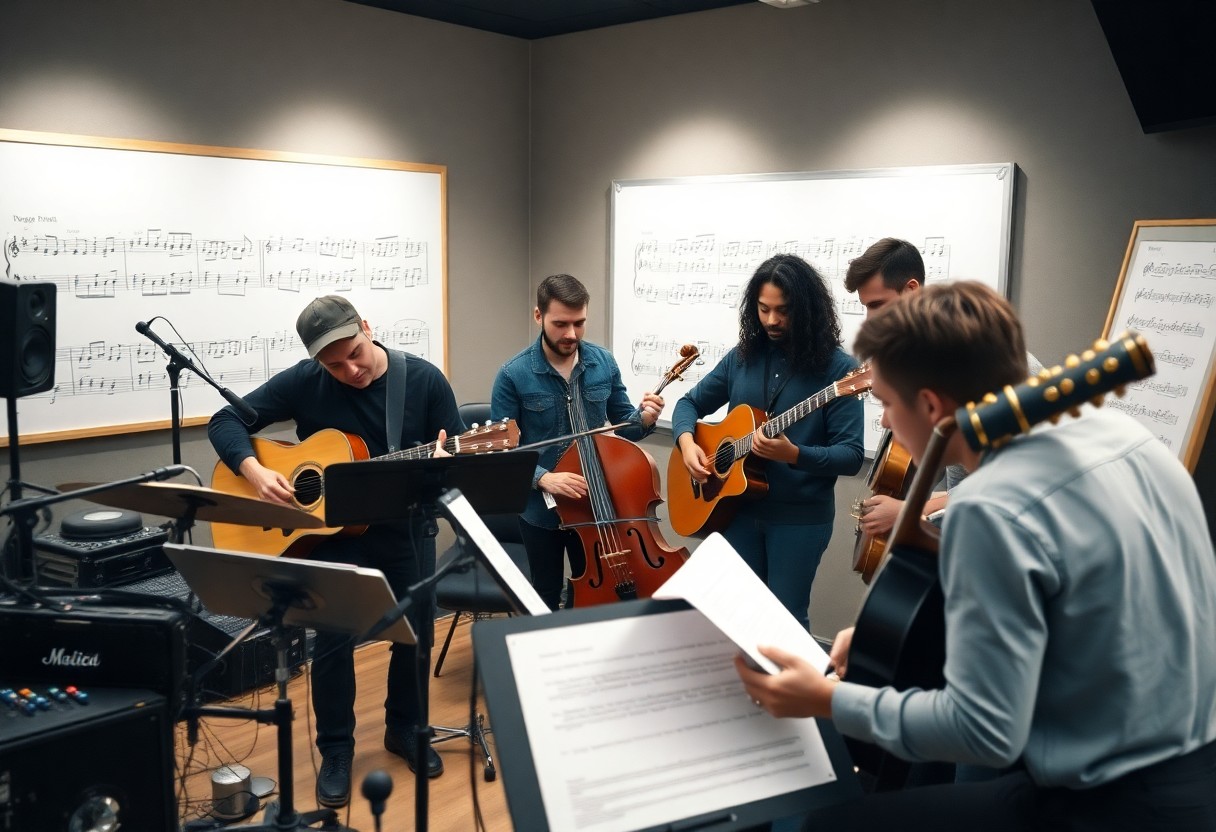You may not realize it, but effective band collaboration is the backbone of successful music creation. When you engage in teamwork with your bandmates, you open up a world of creative possibilities that can elevate your sound and strengthen your relationships. Embracing collaboration allows you to combine individual strengths, leading to more innovative compositions and dynamic performances. However, poor collaboration can lead to misunderstandings and hinder your progress, so it’s imperative to identify effective communication strategies. This post will guide you through the vital aspects of collaboration, teamwork, and their impact on your musical journey.
Key Takeaways:
- Collaboration enhances creativity by combining diverse musical styles and perspectives.
- Effective communication among team members is necessary for aligning artistic visions.
- Setting clear roles and responsibilities helps streamline the music creation process.
- Open-mindedness fosters innovation and allows for experimentation with different sounds.
- Regular feedback sessions can improve the overall quality of the music produced.
- Building strong relationships within the group contributes to a positive and productive environment.
- Leveraging technology can facilitate collaboration, making remote teamwork more efficient.
Understanding Band Dynamics
While a band’s success often hinges on the synergy between its members, it is important to grasp the dynamics at play. Understanding how personalities, roles, and creative processes intertwine can significantly enhance collaboration and music creation. By recognizing and nurturing these dynamics, you create an environment that fosters teamwork, ultimately leading to more cohesive and innovative musical results.
Role Distribution and Responsibilities
Band members must define their individual roles and responsibilities to ensure a smooth workflow. Each member should leverage their strengths, whether it’s songwriting, instrument mastery, or vocal performance. By openly discussing these roles, you can minimize overlap and confusion, leading to more effective and efficient collaboration.
Communication Channels in Band Setting
Among the many aspects that influence your band’s creativity, effective communication is paramount. Establishing clear channels not only facilitates idea sharing but also helps in resolving conflicts that may arise. Open dialogue fosters a supportive environment where each member feels valued and heard, ultimately enhancing your music creation process.
Indeed, maintaining strong communication channels within a band can have a significant impact on its overall success. When you establish regular check-ins and use collaboration tools, you enhance transparency, making it easier for everyone to contribute. Feedback should be encouraged, allowing you to refine your sound continuously. Keep in mind that poor communication can lead to misunderstandings and tension; therefore, prioritizing open and honest discussions can keep your band united and motivated. The positive effects of strong communication resonate through your practice sessions and performances, potentially elevating your music to new heights.
Building Creative Synergy
Some of the most impactful music emerges from the melding of diverse ideas and talents within a group. When you collaborate, you have the opportunity to tap into each member’s unique perspectives, ultimately leading to innovative sounds and engaging compositions. The essence of creative synergy lies in how these collective contributions can elevate the music-making process, enabling you and your bandmates to produce works that resonate with a broader audience.
Collaborative Songwriting Process
Around the creative table, you and your bandmates can brainstorm concepts and themes that inspire your songs. This collaborative approach allows each person’s strengths to shine, making for a more dynamic and engaging writing experience. As you share ideas and build upon one another’s input, the melody and lyrics can evolve in ways you might not have achieved alone.
Arranging Music as a Team
Synergy in arranging music occurs when you actively integrate the strengths of each band member into the final piece. This approach ensures that every instrument and vocal part has a distinct role, enriching the overall sound. You’ll find that when everyone contributes to the arrangement, you create a more cohesive and compelling musical experience.
Even in the arrangement stage, you should prioritize open communication and creative vulnerability. This means sharing not only your ideas but also being willing to embrace suggestions from others. It can be both empowering and challenging to incorporate everyone’s perspectives, but when you strike that balance, the end result is a richer and more diverse sound. The goal is to create an arrangement where each member’s contributions come together seamlessly, leading to a powerful musical narrative that captivates your audience.
Managing Creative Differences
Now that your band is formed, you’ll inevitably face creative differences. These differences can lead to tension and conflict, but they can also offer opportunities for innovation and growth. Embracing diverse perspectives in music creation is vital, so it’s important to establish a culture of open communication. You can navigate these challenges by addressing disagreements positively, ensuring that each member feels heard while striving for a shared vision. This will not only strengthen your creative process but also enhance your teamwork as you collaborate.
Conflict Resolution Strategies
Among the many strategies for resolving conflicts, fostering an environment of respect and active listening is key. When disagreements arise, take the time to acknowledge each band member’s perspective. This may involve setting ground rules for constructive critiques or establishing a mediator within the group. Creating a safe space allows you to discuss differences without fear, ultimately paving the way for collaborative solutions that benefit everyone involved.
Balancing Individual and Group Vision
Between your personal artistic identity and the collective vision of the band lies the challenge of finding harmony. Each member brings unique styles and influences to the table, which can sometimes clash with your group’s direction. Ensuring that everyone has a voice in decision-making fosters a sense of ownership while also allowing for individual creativity to flourish. Striking this balance can lead to a richer and more diverse musical output that represents all band members.
Managing individual aspirations while aligning them with the group’s goals requires careful consideration. You’ll want to encourage each member to express their ideas, but also keep an eye on the overall musical direction. Discussing your respective visions regularly helps in finding common ground and reduces misunderstandings. Working together on a shared song idea can harness everyone’s creativity, transforming individual sparks into a cohesive sound. This collaborative process strengthens band unity, allowing you to create music that resonates on multiple levels while remaining true to your self-expressions.
Effective Rehearsal Practices
All successful bands know that effective rehearsal practices are vital for achieving tight performances and fostering creativity. By implementing structured approaches, you can maximize your time together and enhance the collaborative spirit necessary for producing great music. From strategic planning to honest feedback, making the most of your rehearsal sessions will elevate your music creation process and strengthen your band’s unity.
Time Management and Planning
The foundation of an efficient rehearsal lies in careful time management and planning. Establish a clear agenda, allocate specific time slots for each aspect of your practice, and ensure every member understands their role. By doing this, you enhance focus and prevent wasted time, enabling your band to make steady progress with well-defined goals.
Feedback and Improvement Systems
Against complacency, creating a system for feedback and improvement can elevate your band’s performance. Regularly solicit constructive criticism from all members, as well as outside listeners, to pinpoint areas that need development. Create a supportive environment where honest dialogue is encouraged; this will foster growth and collaboration.
Improvement in your band’s dynamics and sound can stem from establishing a structured feedback system. By openly discussing performances and offering insights, you invite all voices to contribute, creating a trusting atmosphere. This empowers you to address weaknesses without fear and celebrate collective strengths. Regularly incorporating feedback can significantly enhance your band’s overall performance, making every rehearsal an opportunity for growth.
Technical Collaboration
Many musicians often find that effective technical collaboration enhances their creativity and efficiency in the music-making process. By working together, you can merge different skill sets, techniques, and perspectives, resulting in a richer and more diverse sound. Coordinating technical aspects, from songwriting to mixing, allows for a seamless integration of ideas and fosters a collaborative spirit that can elevate your musical projects.
Recording Sessions Coordination
Against the backdrop of busy schedules, organizing recording sessions can be challenging. Proper coordination ensures that all collaborators are on the same page regarding timings, locations, and objectives. Taking the time to set clear agendas and communicate effectively can significantly improve your overall productivity in the studio.
Equipment and Resource Sharing
Among the various facets of technical collaboration, equipment and resource sharing plays a pivotal role in enhancing your music creation process. By pooling your resources with your bandmates, you can access a variety of instruments, software, and recording gear that may not be available to you individually.
For instance, you might have a top-notch microphone, while your collaborator has a powerful sound interface. When you share these vital tools, it allows for better sound quality and diverse tonal options while working on your tracks. This collaboration also entails scheduling joint sessions to maximize the use of your shared equipment, which can ultimately lead to a more polished product. Moreover, it promotes a sense of community and teamwork among you and your fellow musicians, laying the groundwork for future creative endeavors.
Professional Development
Once again, the significance of professional development in band collaborations cannot be overstated. Embracing opportunities for growth enhances your skill set and fosters a deeper understanding of teamwork in music creation. As you engage with fellow musicians, you will refine your craft while learning to navigate the dynamics of group interactions. This shared journey not only elevates your artistry but also prepares you for future endeavors in the ever-evolving music industry.
Group Decision Making
Below, the process of group decision making plays a pivotal role in achieving a cohesive sound and vision. When collaborating with others, you must learn to articulate your ideas while being receptive to constructive feedback. This dynamic encourages open dialogue, resulting in decisions that reflect the collective input of the group, leading to innovative outcomes that push your music forward.
Career Goals Alignment
An integral aspect of successful collaborations involves aligning your career goals with those of your bandmates. When everyone is pulling in the same direction, you create a synergy that amplifies your collective impact on the music scene.
Also, aligning your career goals with your bandmates ensures that everyone is on the same page, creating a unified vision for your musical journey. When you pursue shared objectives, you can bolster each other’s strengths while working through any differences that may arise. Communication is necessary for identifying potential conflicts, as your group can navigate challenges more effectively with a clear understanding of each member’s aspirations. Keeping an eye on the bigger picture will not only facilitate growth but will also enhance your collaboration, propelling your group toward sustained success in the industry.
Summing up
Now, you understand that band collaboration and teamwork are crucial in the music creation process. Your ability to effectively communicate and share ideas with your bandmates can lead to richer soundscapes and innovative compositions. By embracing the diverse strengths and perspectives within your group, you can elevate your music to new heights while fostering a supportive creative environment. Emphasizing collaboration will ultimately enhance your artistic journey and result in memorable musical experiences.
FAQ
Q: What is the importance of collaboration in music creation?
A: Collaboration in music creation fosters diverse perspectives and ideas. When artists team up, they can blend different styles and genres, which often results in a more innovative sound. Working together also allows musicians to share their strengths, learn from one another, and inspire each other, leading to a richer and more dynamic creative process.
Q: How can effective teamwork enhance a band’s performance?
A: Effective teamwork cultivates a supportive environment where each member feels valued and heard. This cohesion boosts communication during rehearsals and performances, ensuring that everyone is synchronized and shares a common vision. When a band works well together, their energy is palpable, making their live shows more engaging and enjoyable for the audience.
Q: What are some practical tips for successful band collaborations?
A: To ensure successful collaborations, bands should set clear goals and establish open lines of communication. Regular meetings can help members discuss their ideas and progress. Additionally, being flexible and open to feedback encourages creativity and strengthens relationships. Scheduling time for brainstorming sessions can also spark new ideas and keep the collaboration dynamic.
Q: How do different musical backgrounds contribute to creativity in a band?
A: Different musical backgrounds bring unique influences and techniques to the table, enriching the collaborative process. Each member may introduce novel sounds, approaches to songwriting, or instrumentation that can transform the band’s music. By embracing these varied perspectives, bands can create a distinct identity that stands out in the music industry.
Q: What role does trust play in team collaboration among musicians?
A: Trust is foundational in team collaboration as it allows musicians to express their ideas and take risks without fear of judgment. When band members trust each other, they are more likely to share personal insights and creative concepts that can elevate their work. This trusting environment encourages vulnerability and experimentation, leading to more authentic and original music.









